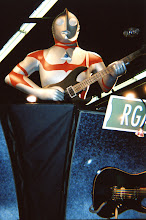
Here's something you might want to type into Google to help you make your own personal radio show: the Last Electro-Acoustic Space Jazz & Percussion Ensemble. You might just want to type it into Google because it's a very lovely thing to type. And then, as a reward, it will take you somewhere. You'll come across a new album by them called
Miles Away (Stones Throw), which isn't totally what you think it is because of that title, and yet is – it's not directly a
Miles thing but an electronically moderated tribute to a kind of hard, ethereal post-bop jazz that mixes the free and the arranged, the drum and the horn. Put it this way: it'll take you nicely on your radio show from Ascenseur pour l'échafaud Miles to this minute's
Gorillaz. Then you can play
Floating Points, Flying Lotus and
Flying Lizards, and take it from there.
Actually, Miles Away sounds like music you could hear on Radios 2, 3 and, to some extent, 4, but it's not likely to appear on many commercial playlists. As smart, accessible, gorgeous and right on the dissolving, accelerating now as it is, as elegantly conceived to look and sound great as a prized vinyl object, summoning all sorts of longing and learning, it doesn't fit into known grooves, or safely known avant-genres, even though ultimately it's jazz-related and rooted in hip-hop adventure. It's jazz for those who like their jazz deeply cosmic, to suggest where the great Blue Note acts might be in a post-sampling, post-rock, post-web, post-computer game world, jazz for those who like their jazz to have a relationship with tradition that is both respectful and mischievous.
The Last Electro-Acoustic Space Jazz & Percussion Ensemble is yet another alias of the sound-spinning, time-jumping, music-mapping many voiced multi-instrumentalist
Madlib, who never stops, who cannot keep still and is hard to keep up with, as he sorts out his agile, vigilant mind by jumping from character to character, project to project, scene to scene, decade to decade, punch line to punch line. He's
Prince as hallucinated by
Philip K Dick, Coltrane running through the veins of
Burroughs, himself more or less aka someone else altogether. He's spent a lot of the past few years fixing into place, and then moving away from that place, eloquent fusions of hip-hop and jazz, inventing groups, and then playing all the roles and instruments in these imaginary groups, so that he's
Kamala Walker of the Soul Tribe, Monk Hughes of the Outer Realm, Eddie Prince with the Fusion Band, Ahmad Miller of the Suntouch; he's everyone in
Yesterdays New Quintet, jamming among his many competing, combining selves. I think. Don't hold me to any of this.
As soon as you think you might have caught up with his new name(s), latest release, current sound, freshest calculation, he's somewhere else, following a new lead, reworking an old gag, digging up more buried treasure, on the run to the inside and outside of everything.
He moves so fast and fluidly through ideas and possibilities, creating a personal, brilliant history of music as he mixes himself and his other personalities with possibly real collaborators and ways of paying tribute to, say,
Stevie Wonder, the Trojan label, the Blue Note label, movie soundtracks, jazz hybrids known only to the most fervent connoisseur, that he almost becomes invisible. Perhaps if he stayed in one place one time, instead of tripping behind blurring names, masks, identities, passions, visions, revisions, disclosures, his latest album, his latest blast from a past he makes seem like the future, he might get more of the fashionable attention. But fame to him is just another illusion he's messing around with. He's taking the chasing of freedom to sensational extremes.
Another way of looking at it is that
Madlib, this master manipulator of history, ego, sound, electronics and image, this boastful anti-publicist, is the ultimate superstar of a new ghostly, free-forming alternative universe, a dark, crazed underground you can reach into through that tempting Google door, another shape-shifting reality made up of found and remade realities, a hyper-electric zone where you can organise endless presences, and presents, for yourself.
Yes, there are numerous attractive pop stars out and about at the moment, all piling on top of each other, all building on the shapes, poses, publicity stunts and role-playing antics of various antecedents, sounding wonderful if a little shallow, all being showered with awards, places in pop charts and playlists, stars on Amazon, all relishing their ability to exploit and dominate the far-fetched internet era to ensure the success of their ever-present glamour and state-of-the-art fuss – but this far into the 21st century, to be as fixed, as regular, as just another update, a latest minor correction, to
Prince or
Bowie or
Madonna or
(T. Rex) Bolan or
Grace (Jones?) seems a little old-fashioned, a tame, actually conservative way of reacting to and reflecting all the technological and environmental changes happening everywhere at each given moment.
Hidden deep in the turbulent centreless centre of all this diverting possibility, cut off from the lively but mundane pop civilisation as represented by the award shows, the famous faces and the mainstream indie websites, fragmenting his personality, his relative fame, his musical enthusiasms into more and more randomly interrelated bits, exists
Madlib. The racy, shady, mad king of this other, oddly realer, world. The invisible, improvising, abstract superstar, experimenting with time, scattering clues all over the less than secure place, checking out the limits of the imagination, hinting how we might operate in the future, where we will be able to freely select, compile and adjust our multiple identities and the numerous dimensions we inhabit. Now that's what you want a musician to do: see into the future by listening to the past to remake the present. Even if very few notice at the time. (
source)









